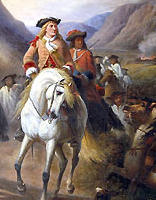Frauds, Cons and Scams
So Weird It Hurts?

Cartoon expletives aside, a bit of invective can do you the world of good, or so said scientists recently. A research team from from Keele University asked volunteers to hold their hand in freezing water for as long as they could manage while repeating either an innocuous word or the swear-word of their choice. The swearers held out for an average of two minutes, while non-swearers managed only 1 minute 15 seconds. But while Rohan Byrt of the Casual Swearing Appreciation Society claimed the study demonstrated the benefits of swearing, team leader Richard Stephens warned that everyday swearing would lessen its painkilling effects. "Swearing is emotional language" he explained, "but if you overuse it, it loses its emotional attachment" (BBC News).
From this week, pregnant women throughout Britain considering "letting it out" to help with the pain might also want to direct their curses towards Dr Denis Walsh, associate professor of midwifery at Nottingham University in England. In an article in the journal Evidence Based Midwifery, Dr Walsh claimed last week that the pain of childbirth was useful and a "timeless rite of passage", and women should not be trying to avoid it with epidural anaesthesia. Walsh based his statement on the fact that the use of epidurals has almost doubled in the past two decades, claiming that in 20% of cases, the procedure was unnecessary. While some, like Dr. Justin Clarke of the Birmingham Women's Hospital, rejected Walsh's data, saying it was wrong to characterise modern women as "less stoical", others supported him, such as Mary Newburn of the National Childbirth Trust who spoke of there being an "epidural culture" (Telegraph).
But perhaps women might be convinced to trade in the needle for a fancy rubber suit? Baltimore company Under Armour has developed a hi-tech, full length bodysuit that is said to allow athletes recover more quickly after strenuous activity. Under Armour's "Recharge" range gently squeezes the athlete's body forcing excess fluid out of the muscles and back into the bloodstream over a period of hours after a workout, reversing the "pumped" effect of the exercise. Research by the University of Connecticut showed that doing so resulted in subjects feeling less soreness and swelling of the muscles and recuperating faster (Journal Gazette).
More in extended >>
Posted By: Dumbfounded - Tue Jul 14, 2009 -
Comments (3)
Category: Exercise and Fitness, Frauds, Cons and Scams, Health, Injuries, Medicine, Obscenity, Science, Experiments, Stupid Criminals, Weddings
American Artifacts
Here's a neat site that offers lots of strange gadgets from the past, such as this "Radio Disease Killer."
Posted By: Paul - Fri Jul 03, 2009 -
Comments (2)
Category: Frauds, Cons and Scams, Medicine, Nineteenth Century
Thomas Inch and the Inch Dumbbell

Thomas Inch (1881-1963) was a famous weightlifter from England. He is most famous for having a 172 pound dumbbell that nobody else could lift off the floor with one hand. He would offer large sums of money to anyone that could lift it. It is possible, however, that his act was a scam, as he had 4 dumbells that looked the same but were different weights (bait and switch?) and he never challenged a handful of lifters that were considered stronger than him. He was also very careful in how he phrased his own lifting of the weight as he never really mentioned putting it overhead with just one hand.
More in extended >>
Posted By: fyshstyxx - Thu Jun 25, 2009 -
Comments (0)
Category: Exercise and Fitness, Frauds, Cons and Scams, Human Marvels
One For You, One Hundred For Me…
The justice system in Lancashire UK have struck a blow for the consumer by jailing a prolific eBay scammer and fining him over £100,000, but just one thousand of this will be used to pay back his victims. Jonathan Hartley was jailed for 18 months after a Police investigation looked into complaints going back over six years. In court Hartley pleaded guilty to multiple counts of fraud (and one of money laundering), which are believed to have netted him over £140,000.Taking into account the money he has already spent, Lancashire Crown Court have ordered he raise the £102,000 fine by August or face another 12 months on his sentence and the £102k fine (plus interest). Because only 34 victims have been positively identified, less than a thousand of this 'restitution' will be paid out in compensation. The rest will be split equally between the prosecutors (government), the courts and the police (Pendle Today).
Posted By: Dumbfounded - Tue May 19, 2009 -
Comments (3)
Category: Cops, Crime, Frauds, Cons and Scams, Government, Law
The Baron of Arizona
Bernie Madoff was a piker.He stole a few score billion dollars.
But how much is a whole state worth? All the land, natural resources, and structures?
That's what James Addison Reavis stole--almost getting away with the theft too.
Last night I watched THE BARON OF ARIZONA, a 1950 film by Samuel Fuller and starring Vincent Price. It tells the true story of Reavis, who cooked up an incredible con job to lay claim to the entire territory of Arizona in the year 1883.
You can read a fascinating essay about it here.
This is one film definitely worth renting for those with a taste for weird history.
Posted By: Paul - Wed Apr 29, 2009 -
Comments (1)
Category: Frauds, Cons and Scams, History, Historical Figure, Wild West and US Frontier, Hoaxes and Imposters and Imitators, Movies, Nineteenth Century, Arizona
Girl Weeps Crystals
Girl Has Crystals Coming Out Of Eyes - The best free videos are right here
Posted By: Paul - Mon Apr 13, 2009 -
Comments (4)
Category: Frauds, Cons and Scams, Human Marvels, Medicine, Middle East
Breatharian FAQ
Posted By: Paul - Fri Apr 10, 2009 -
Comments (4)
Category: Eccentrics, Food, Frauds, Cons and Scams, Religion, Self-help Schemes
The Camisards

Well, not all the time.
Consider the French Protestant dissenters known as the Camisards.
I learned about this historical incident from reading Robert Louis Stevenson's Travels with a Donkey. (You can find the entire text of the book here.) Stevenson traveled through the region once ruled by the Camisards, and evoked the romance of their rebellion.
There, a hundred and eighty years ago, was the chivalrous Roland, "Count and Lord Roland, generalissimo of the Protestants in France," grave, silent, imperious, pock-marked ex-dragoon, whom a lady followed in his wanderings out of love. There was Cavalier, a baker's apprentice with a genius for war, elected brigadier of Camisards at seventeen, to die at fifty-five the English governor of Jersey. There again was Castanet, a partisan in a voluminous peruke and with a taste for divinity. Strange generals who moved apart to take counsel with the God of Hosts, and fled or offered battle, set sentinels or slept in an unguarded camp, as the Spirit whispered to their hearts! And to follow these and other leaders was the rank file of prophets and disciples, bold, patient, hardy to run upon the mountains, cheering their rough life with psalms, eager to fight, eager to pray, listening devoutly to the oracles of brainsick children, and mystically putting a grain of wheat among the pewter balls with which they charged their muskets.
Pretty weird, huh? And right in Europe, not all that long ago.
The last sentence from Stevenson is particularly intriguing, since it conjures up comparisons to the Mai-Mai rebels in the Congo today, who believe that certain magical charms protect them against bullets; that their own bullets are invulnerable to counter charms; and that ritual cannibalism of their enemies is still a grand idea.
Once Europe had its own Mai-Mai's. Perhaps someday Africa will be rid of theirs.
Posted By: Paul - Thu Jan 22, 2009 -
Comments (10)
Category: Cannibalism, Death, Frauds, Cons and Scams, History, Historical Figure, Magic and Illusions and Sleight of Hand, Paranormal, Religion, War, Weapons, Foreign Customs, Africa, Europe, Eighteenth Century
The Lunar Federation

Posted By: Paul - Mon Dec 22, 2008 -
Comments (5)
Category: Frauds, Cons and Scams, Real Estate, Space Travel
The Bad Sleep Well
We've been alerted to the serial killer in Japan who's taking revenge for corporate fraud, as described in this article in today's NY TIMES. But what no one seems to have noticed is that we've already seen this scenario in a film. THE BAD SLEEP WELL is one of Akira Kurosawa's masterpieces, and details how a man whose father was killed by corrupt businessmen exacts his revenge. Here's the excellent trailer.
Posted By: Paul - Sat Nov 22, 2008 -
Comments (1)
Category: Business, Crime, Death, Frauds, Cons and Scams, Movies, Foreign Customs, 1960s, Asia

| Who We Are |
|---|
| Alex Boese Alex is the creator and curator of the Museum of Hoaxes. He's also the author of various weird, non-fiction, science-themed books such as Elephants on Acid and Psychedelic Apes. Paul Di Filippo Paul has been paid to put weird ideas into fictional form for over thirty years, in his career as a noted science fiction writer. He has recently begun blogging on many curious topics with three fellow writers at The Inferior 4+1. Contact Us |






